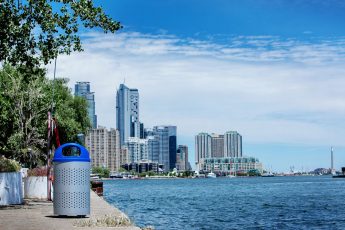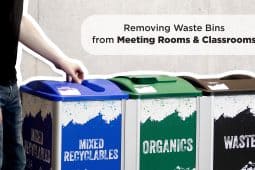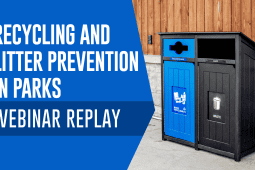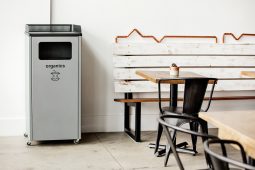For more information on how to build an exceptional recycling program for your college/university, click here.
We’ve been building exceptional college recycling & waste management programs for over 35 years. Here’s 9 key secrets we’ve unearthed that’ll build the zero waste campus program you’ve always wanted for your post-secondary institution and save you money in the process.
Let’s start with the facts.
Universities and colleges in the often have populations of students, staff and faculty that rival small towns, or even cities. By running a campus-wide recycling program, you can help ensure that the amount of trash that ends up in landfills is reduced, and that recyclable items are turned into new products:
- Members of the Columbia University Greens found that each college student on average produces 640 pounds of solid waste each year, and it was estimated that college students in the United States alone contribute over 200 million tons of waste in a year
- According to Tufts University, there is a significant spike in the amount of solid waste generated on college campuses specifically during the months of May and June, when their students leave behind an average of 230 tons of waste.
- A 2014 study from the University of Iowa determined that 51 percent of students in their dataset recycle “as much as possible,” while only 9 percent said they don’t recycle at all. Among the latter set, the two main reasons cited for not recycling were lack of available space and no available information on how and where to recycle.
In the era of the Green Economy, it’s essential for every college and university to have an effective recycling program in place. An effective program focuses on reducing waste, reusing useful materials and recycling them. Ineffective campus programs tend to generate a lot of waste, require regular maintenance and expensive waste disposal. Bearing these things in mind, let’s take a look at 9 key ways to enhance the effectiveness of your college/university waste management program.
- Always begin with a preliminary waste audit to categorize and quantify your campus waste
Step one of building a successful waste management program for any industry begins with identifying and categorizing the types and quantity of waste produced by every segment of your grounds. Use a map of your grounds to identify key areas (i.e classrooms, recreational facilities, lecture halls, dormitories, etc.) and begin to identify what types of waste is being generated in each area.
For example, administration/classroom waste (like papers, documents, brochures), household waste in dorm rooms (cans, bottles, cardboard), and organic waste from on-campus cafeterias or restaurants (vegetable and fruit peels, flowers) can be separated into custom, color-coded bins for easy stream identification and simple waste disposal that minimizes contamination.
- Build a Green Team
How much time does your campus facilities management team have to spare for sustainability initiatives?
If the answer is less than you would like, a green team can be the most valuable ally in your quest for building an effective recycling program.
A Green Team can be a small group of employees and students whose combined goal is to educate, empower and inspire fellow students and staff to establish and promote environmentally sustainable practices within their organization. Every new initiative needs a full launch campaign and a group of influencers that will help build the momentum of your program. Without a green team, it will be very difficult to get your new waste management program off the ground.
To setup your green champions for long term success, make sure this group has formal oversight, tools for measurement and verification, and a clear mission.
- Communicating your program to your guests is essential
While awareness and the desire to recycle exists, students need an actionable plan and facilities to help them see how the recycling & waste program works on their campus. For students, a lack of instruction affects their daily recycling behavior throughout the school year, but it is a particular concern when they are moving in and moving out. When students return home after their school year, they may be returning to a location where the recycling program may be completely different. This means you have to continuously educate your students about the materials you’re collecting and how they’re separated into specific streams.
Start with your recycling stations! Make sure your recycling & waste labels on your containers are clear and easy to understand. Many campuses have students from all parts of the globe that speak many different languages. Use impactful graphics with clearly identifiable images of typical items that can be discarded and standardize these graphics, so they’re consistent throughout your college/university.
Get everyone on board with your program by telling everyone about it! Communicate and educate staff and faculty about the school’s goals and the sustainability initiatives so they can pass the knowledge onto your students. Programs like Recyclemania have also proven to provide a successful blueprint towards increased diversion rates through friendly competition and mass-communication.
- Modify your operational habits
The daily operation of your campus provides you with an excellent testing ground for some of the waste management techniques.
Reducing the amount of waste begins with modifying little things. Here’s some examples to get your creative juices flowing:
- Switch to refillable dispensers for cleaning products in every room.
- Use dishware to serve meals instead of disposable plates in your campus cafeterias. This not only reduces the waste, but elevates your brand in the process.
- Instead of selling bottled water, install water fountains throughout your campus.
- Use high-traffic areas to promote your recycling goals by adding large, attractive recycling stations with signage to promote your messaging
- Avoid paper products other than toilet paper in the bathrooms.
- Using LED bulbs instead of regular ones automatically means fewer replacements since LED bulbs last up to 10 times longer.
- Dormitory recycling programs can be a significant source of cost savings
Every room counts! One may assume the seemingly small amount of waste generate in each room is insignificant compared to waste generated at central, high-traffic locations across the campus. Not true! College dorm rooms normally house one, two or up to four students in a quad. Many recyclables are generated from the kitchen, but there is still a tremendous amount of waste generated in the dorms rooms themselves. Students still prepare food in their dorm room, utilize packaging, drink sodas and other beverages, and have many opportunities to recycle. Without a specific example from a college or university on hand, here’s a similar example:
Kimpton Hotels — the company behind 70 Park Avenue in New York and the EPIC Hotel in Miami — has saved about $267,300 a year through the in-room recycling programs that have been in place across the chain since 2004. In an interview with the NY Times, Niki Leondakis, COO for Kimpton mentioned, “Just cardboard recycling alone ranges from $12,000 to $20,000 a year in savings,”
According to Kimpton’s website, the chain reduces its trash at its 47 hotels by more than 40% through recycling alone.
- Ditch single-use plastics
As part of its ongoing sustainability efforts, Vanderbilt University announced it will eliminate all single-use plastic water and soda bottles in its operations throughout dining facilities, markets and vending machines.The collaborative effort—which involved the student organizations Students Promoting Environmental Awareness and Responsibility (SPEAR) and Vanderbilt Student Government and will save more than 430,000 plastic bottles per year and over 1.7 million bottles during a graduating class’s four-year experience—is part of the university’s FutureVU strategy to significantly reduce Vanderbilt’s environmental footprint and put the university on track to be carbon neutral by 2050. The amount of plastic saved in one year is enough to cover the university’s football field almost 1.5 times.Changes like these have a large positive impact on the environment and lead to a significant reduction in waste management costs on your college campus (i.e time spent collecting litter and waste tipping fees).
- Re-evaluate Disposal Habits
Not long ago, waste removal was mostly built around collecting co-mingled materials and sending the waste to landfills, where it was incinerated or compacted by waste disposal companies. These days, however, your green team and facility management staff can take an active role in managing part of the process.
Food waste is the single largest waste stream on a college campus day-to-day and fortunately there’s a new crop of haulers that focus solely on organics/compost collection that will gladly collect your food waste, often at reduced costs. And if that’s not an option, you can always invest in food composters to reduce the binned waste generated by food leftovers.
- Choose the right recycling stations
There’s a plethora of factors you need to consider when purchasing containers to suit each space around your campus—too many to cover in this blog! However, as a start, if you want your college/university recycling & waste program to be successful, it’s imperative that you choose containers that keep all of the collection streams together, regardless of their location across your campus.
For example, if there isn’t a recycling or compost stream directly next to the trash stream, students just end up tossing all their waste in the most convenient bin—the closest one. This leads to enormous amounts of contamination, which can derail your sustainability goals due to your recycling and compost often ending up in the landfill rather than being properly sorted at your community’s Material Recovery Facilities (MRF).
Quickly, some other things to consider when choose the right recycling & waste station are:
- Placement
- Climate
- Capacity
- Restrictive Openings
- Signage & Label Customization Capabilities
- Set sustainability standards for your campus vendors
You should have complete control of the high-quantity materials entering your facilities (i.e single-use plastics, soaps, food packaging, etc.). Communicating standards to your vendors and choosing more sustainable alternatives will have a large impact on the quantity of waste and therefore your disposal costs.
Start your campus waste management program off on the right foot by taking advantage of these 9 industry secrets! Once you’ve launched your college/university recycling & waste management program, you’ll start to see many more areas for improvement. These minor or major improvements will continue to increase your diversion rate and positive impact on the environment, reduce your costs and ultimately enhance brand loyalty with your guests.
To finish here’s a couple of bonus secrets! Colleges around the globe are getting creative in the ways they’re able to reduce costs while becoming more environmentally-friendly. Take a look:
- The University of Oregon’s Reusable Office Supply Exchange makes surplus office supplies available to staff and faculty, re-portedly saving the university $15,000 each year in office supply costs.
- The book store at the State University of New York at New Paltz no longer offers plastic shopping bags. Instead, students may purchase a canvas bag for $1.00; the bags can be reused, exchanged or redeemed at any time for the same price. The book store reportedly has eliminated the need for 50,000 plastic bags each year.
- At the University of Michigan, for instance, a temporary-job listings handbook was replaced with an electronic version, saving 36,750 sheets of paper each year.
- Duke University’s School of Business, installing a central bulletin board nearly cut in half the number of weekly memos the school distributed to students each year. As a result, the school reported saving $5,904 per semester on pa-per and $2,250 on labor to deliver memos.
Need help getting started? Contact us to chat with our College & University Waste Management Specialists for more direction on where to begin your journey to waste management greatness.













